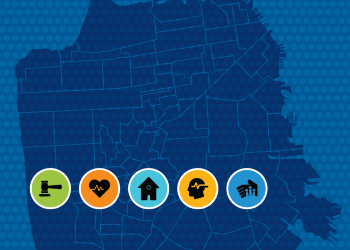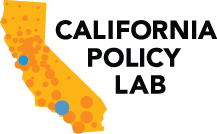- By:
- Category:

San Francisco, CA—Sept 27th—A new report from the nonpartisan California Policy Lab and the Benioff Homelessness and Housing Initiative at UCSF shows that a small number of San Francisco residents are repeatedly cycling in and out of both the county’s health and criminal legal systems each year and represent a disproportionately high amount of utilization of these systems.
The data for this study includes information about more than 270,000 people who interacted with either the urgent/emergent healthcare or criminal legal system at some point during the FY 2011 to FY 2020 timeframe. The report focuses on a small number of these individuals who come into very frequent contact with both systems in the same year. The first group includes 211 individuals who had high utilization of both systems in 2011. The report follows the group through 2020 to examine outcomes including mortality, housing, and health and criminal legal system use. The second group includes 161 individuals with high utilization of both systems in 2020. The report shows their utilization since 2011, to identify factors in the data associated with their eventual high use of multiple systems.
The report defines high criminal legal utilization as at least three jail bookings in a year, while high healthcare utilization is seven or more urgent/emergent healthcare contacts in a year. This research is novel because it links together data from multiple agencies, providing leaders at individual agencies new insights about the people they’re serving, including if they are receiving services from other agencies simultaneously.
“By linking together ten years of data across these systems in San Francisco, we can see how people interact with these systems before, during, and after a year of high utilization, including their history of medical and behavioral health diagnoses and if they’ve received housing services,” explains co-author Dr. Johanna Lacoe, Research Director at the California Policy Lab’s Berkeley site. “That information can help identify potential intervention points and inform strategies to better coordinate services for these individuals.”
Nearly all of the individuals in both groups experienced homelessness. In addition, individuals in the 2011 cohort had high death rates: at least 26% had died by 2020. The authors conclude that more targeted and coordinated interventions, such as connecting people to housing and care options as part of their release from the emergency room or jail, will be needed to support these highly vulnerable residents.
“More than one in four people who had high utilization of both systems in 2011 had passed away by 2020, reflecting how vulnerable these individuals are and how high the stakes are for improving the systems that support them,” adds co-author Dr. Hemal Kanzaria, Medical Director at Zuckerberg San Francisco General Hospital (ZSFG) and an Associate Professor of Emergency Medicine at the University of California, San Francisco.
“Our research highlights the need for coordinated, evidence-based interventions to address these individuals’ complex needs, promote stable housing, and prevent poor health outcomes including untimely death,” explains co-author Dr. Maria Raven, Chief of Emergency Medicine at UCSF Medical Center and co-lead of the Benioff Homelessness and Housing Initiative program on adults with complex needs.
Key research findings:
• 24% of the 2011 high, dual-system utilization group continued their dual high utilization in 2012, but that share decreases with each subsequent year.
• Between 80–90% of individuals in the 2011 and 2020 groups were diagnosed with substance use disorders, and many also have co-occurring mental health and physical health disorders.
• More than 90% of the individuals in both groups had been booked into jail for a felony and a misdemeanor.
• The research team determined that many of the individuals in the 2020 group were in San Francisco in 2011 and had contact with both health and criminal legal systems in the prior 10 years. For example, 30% of the 2020 cohort was booked into jail in 2011.
Additional background
The research team used linked health care and criminal legal system data from the City and County of San Francisco from FY 2011 (July 1, 2010 – June 30, 2011) to FY 2020 (July 1, 2019- June 30, 2020). Criminal legal data are from the SF DA’s Office and the SF Sherriff’s Office. The healthcare data are from the SF Dept. of Public Health Coordinated Care Management System, and include records from nine urgent and emergent physical health, mental health, and substance use disorder services provided by San Francisco health care centers.
The sample for this research included 278,828 individuals who had received services from either the urgent/emergent healthcare system or from the criminal legal system during the FY 2011 to FY 2020 timeframe. Of that sample, 30,755 individuals had contact with both systems at some point during the time period; 24,811 had at least one year of high utilization of one of the systems; and 1,566 had high utilization of both systems in the same year.
The California Policy Lab creates data-driven insights for the public good. Our mission is to partner with California’s state and local governments to generate scientific evidence that solves California’s most urgent issues, including homelessness, poverty, criminal justice reform, and education inequality. We facilitate close working partnerships between policymakers and researchers at the University of California to help evaluate and improve public programs through empirical research and technical assistance.
The Benioff Homelessness and Housing Initiative at the University of California, San Francisco, strives to prevent and end homelessness by conducting impact-oriented research and translating evidence into action. To reduce the number of people experiencing homelessness, BHHI conducts rigorous research to create effective, equitable, and evidence-based solutions. Our studies develop in dialogue with communities to have a direct impact on issues they face. Evidence informs decision makers and practitioners about effective homelessness and housing policies, innovative strategies, and scalable solutions to create healthier communities in the San Francisco Bay Area, the state of California, and across the United States.
